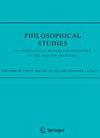原因、意图和行动
IF 1.1
1区 哲学
0 PHILOSOPHY
引用次数: 0
摘要
有几位理论家坚持认为,当且仅当一个考虑因素是一个打算 "j "的理由时,该考虑因素才是一个 "j "的理由("j-ing "是一种行为类型);还有一些理论家认为,当且仅当一个考虑因素是一个打算不 "j "的理由时,该考虑因素才是一个不 "j "的理由。这些主张往往源于对什么是实践理由的看法。这里要论证的是,这两种等价主张都是错误的。虽然我们没有提出任何关于实践理由的观点,但却证明了那些隐含着任何一种等价主张的观点都是错误的。本文章由计算机程序翻译,如有差异,请以英文原文为准。
Reasons, intentions, and actions
Several theorists maintain that a consideration is a reason to ϕ (where ϕ-ing is an act-type) if and only if that consideration is a reason to intend to ϕ, and some hold as well that a consideration is a reason not to ϕ if and only if that consideration is a reason to intend not to ϕ. The claims often stem from views about what it is to be a practical reason. Here it is argued that both equivalence claims are false. Although no view of practical reasons is advanced, views that imply either equivalence claim are shown to be mistaken.
求助全文
通过发布文献求助,成功后即可免费获取论文全文。
去求助
来源期刊

PHILOSOPHICAL STUDIES
PHILOSOPHY-
CiteScore
2.60
自引率
7.70%
发文量
127
期刊介绍:
Philosophical Studies was founded in 1950 by Herbert Feigl and Wilfrid Sellars to provide a periodical dedicated to work in analytic philosophy. The journal remains devoted to the publication of papers in exclusively analytic philosophy. Papers applying formal techniques to philosophical problems are welcome. The principal aim is to publish articles that are models of clarity and precision in dealing with significant philosophical issues. It is intended that readers of the journal will be kept abreast of the central issues and problems of contemporary analytic philosophy.
Double-blind review procedure
The journal follows a double-blind reviewing procedure. Authors are therefore requested to place their name and affiliation on a separate page. Self-identifying citations and references in the article text should either be avoided or left blank when manuscripts are first submitted. Authors are responsible for reinserting self-identifying citations and references when manuscripts are prepared for final submission.
 求助内容:
求助内容: 应助结果提醒方式:
应助结果提醒方式:


